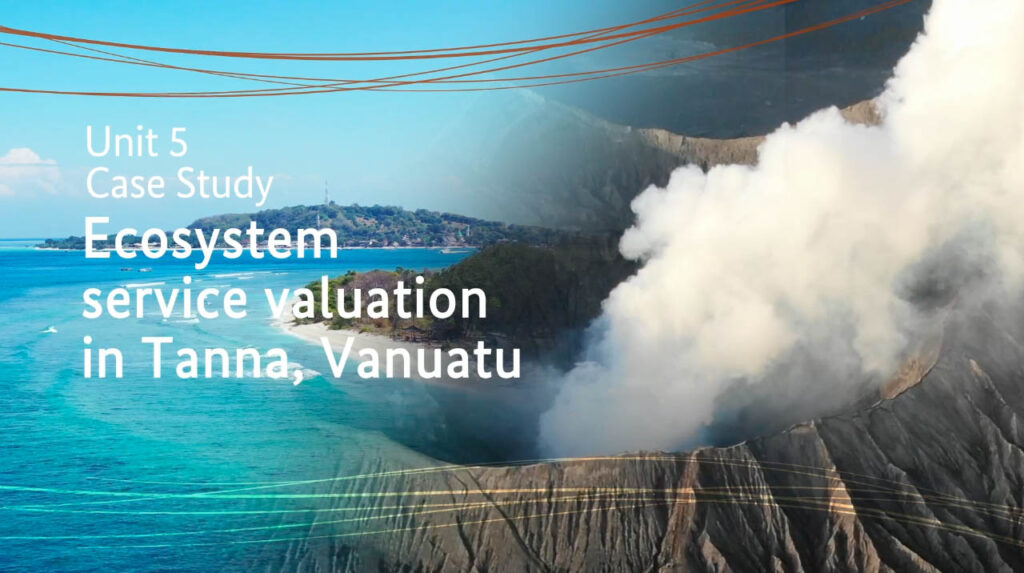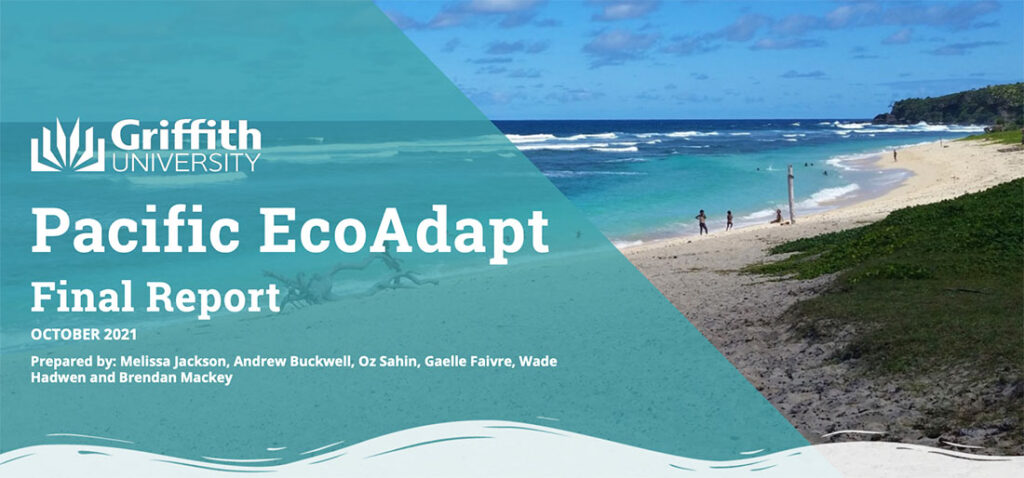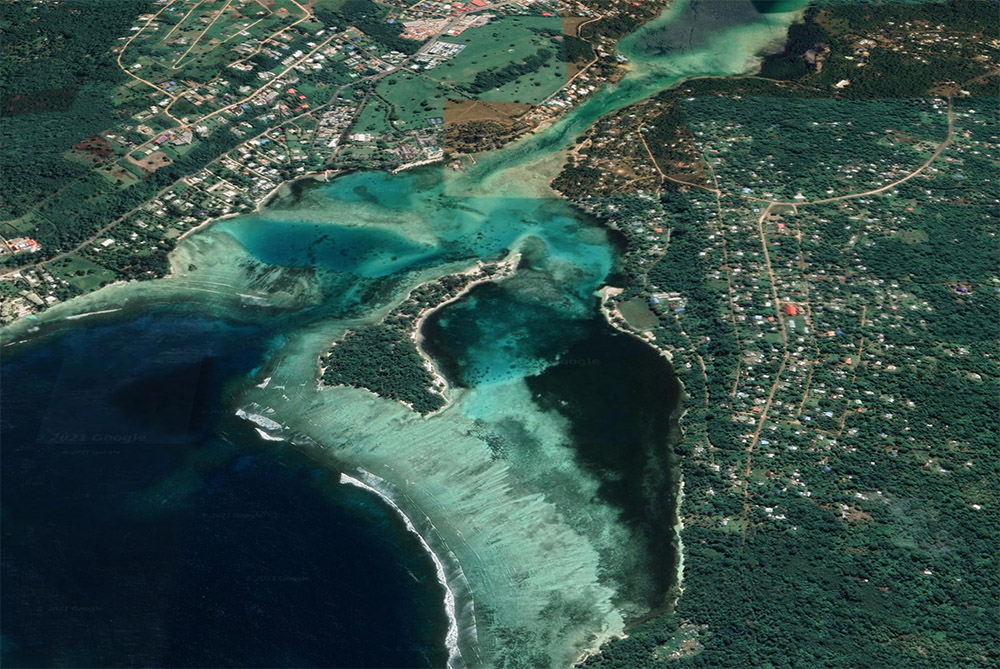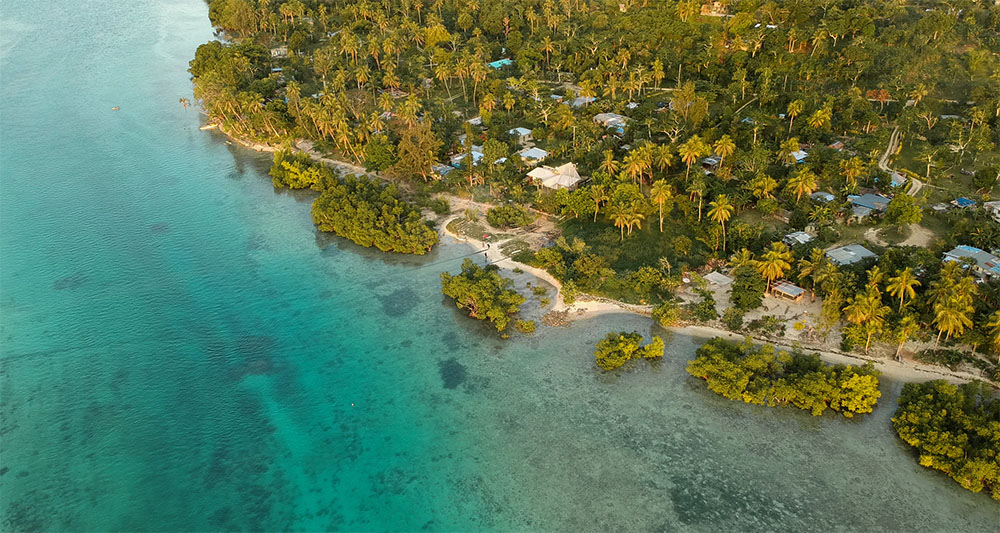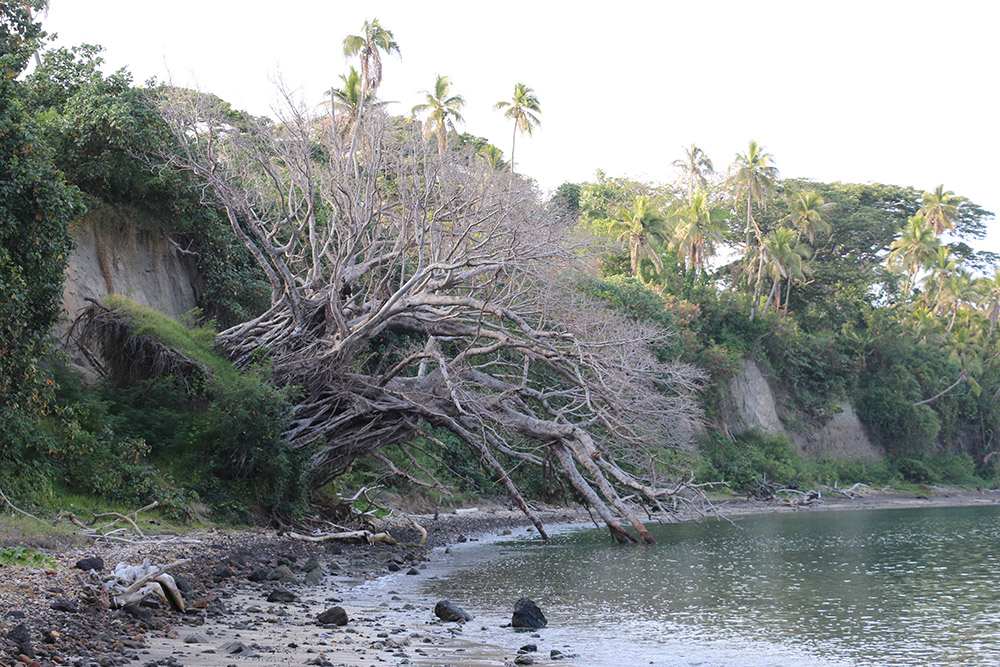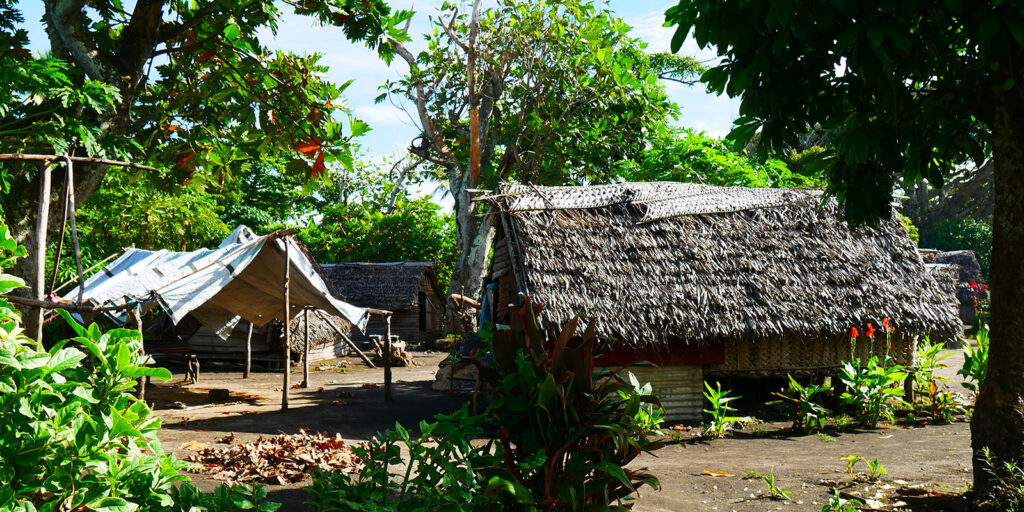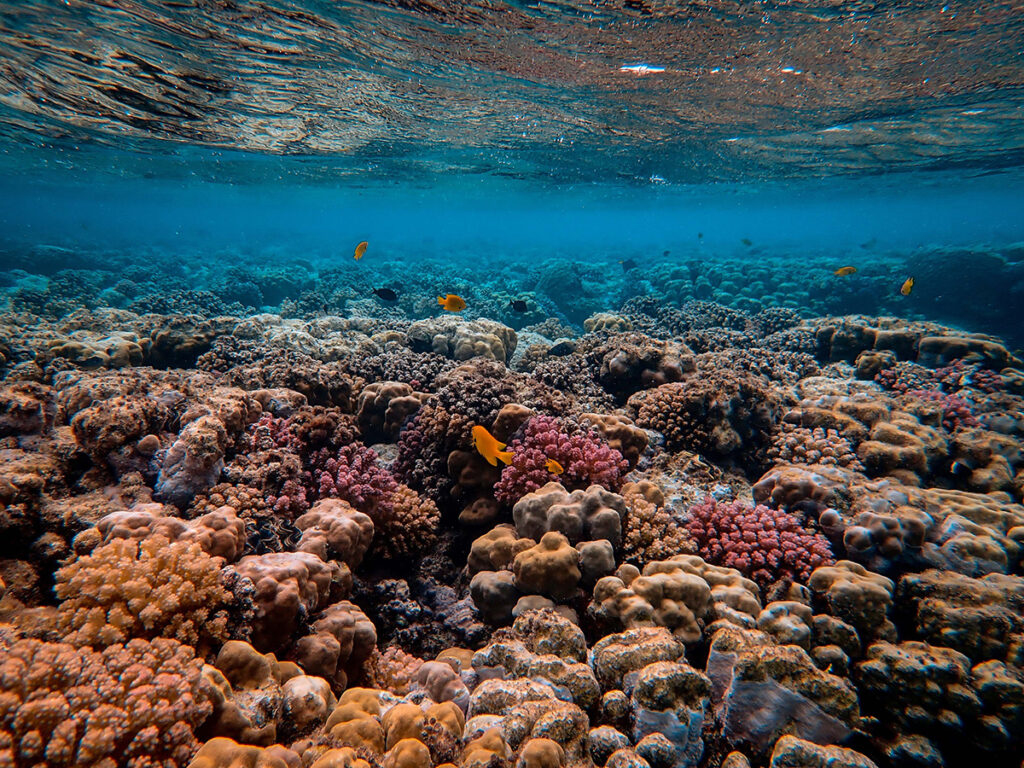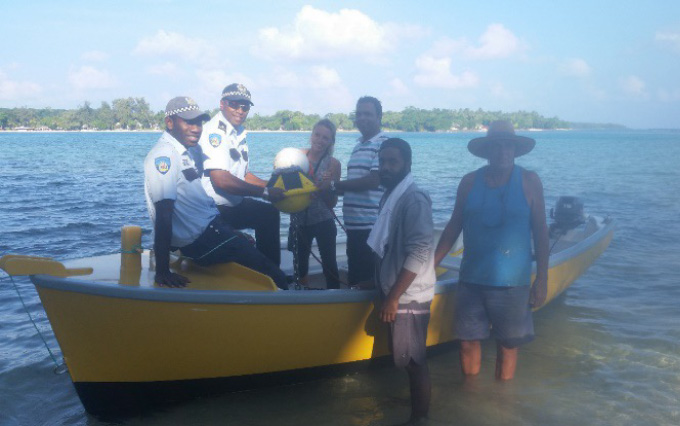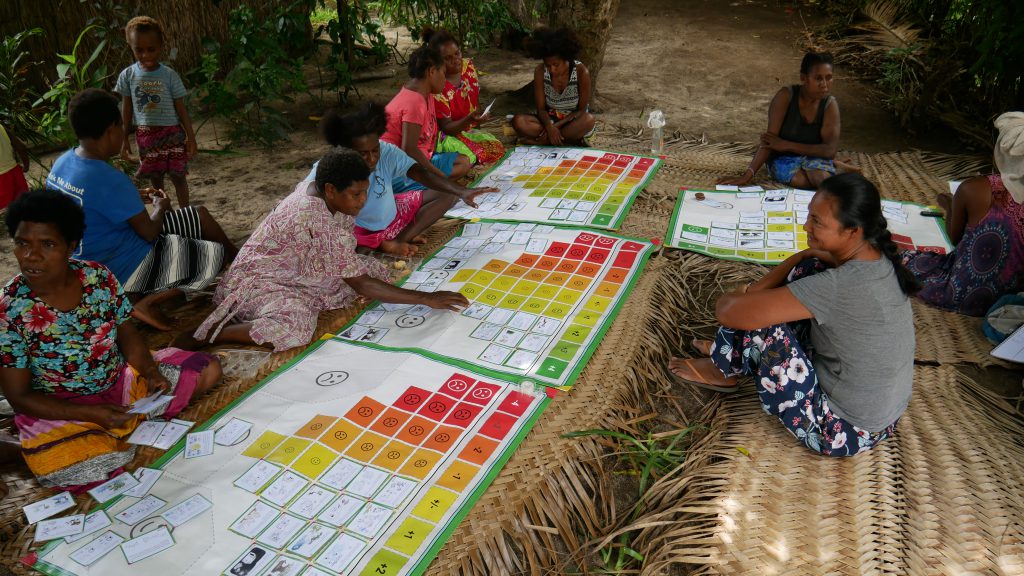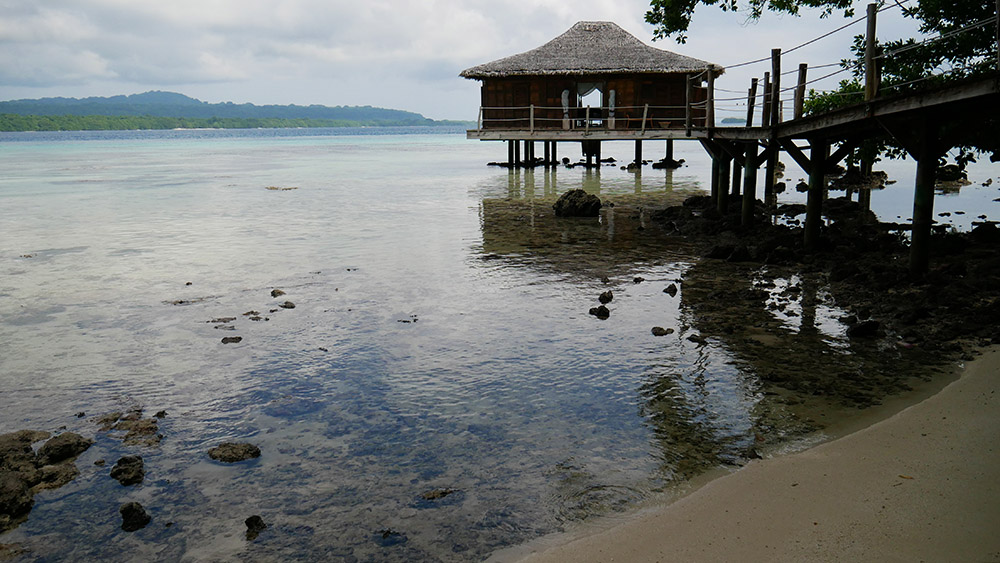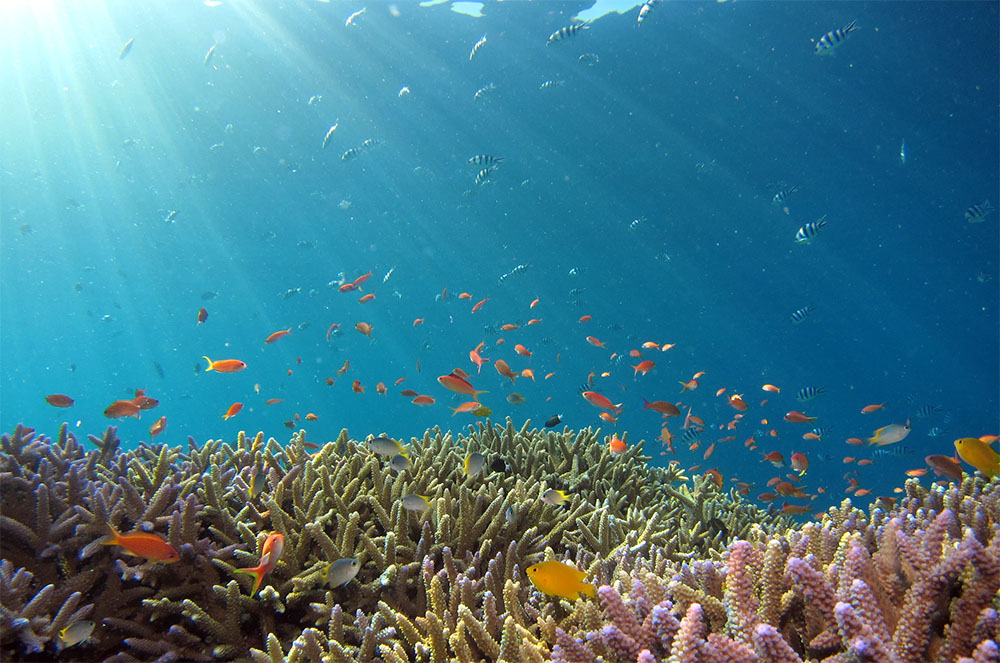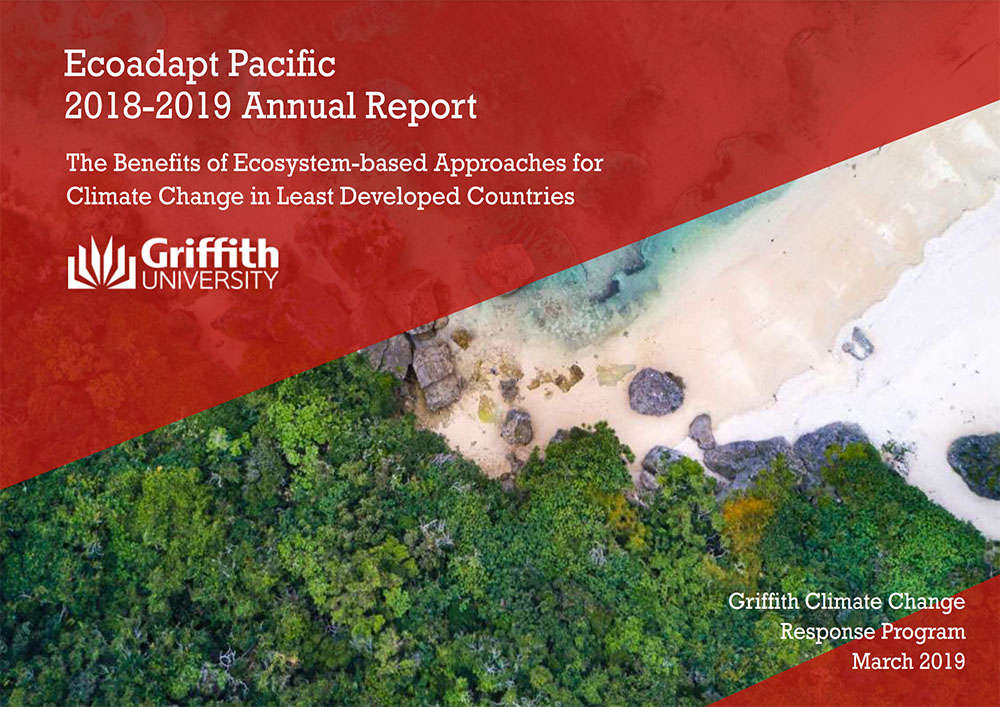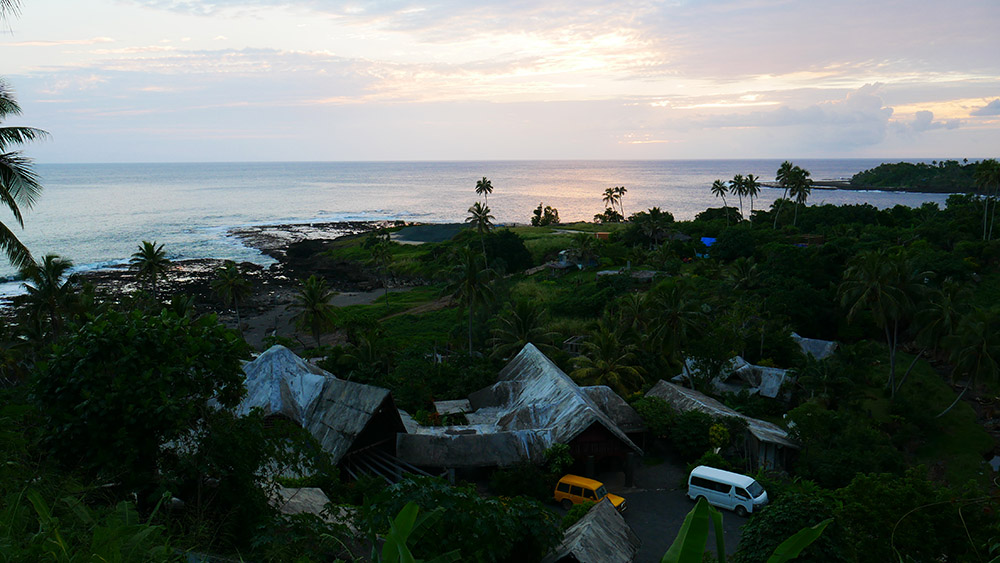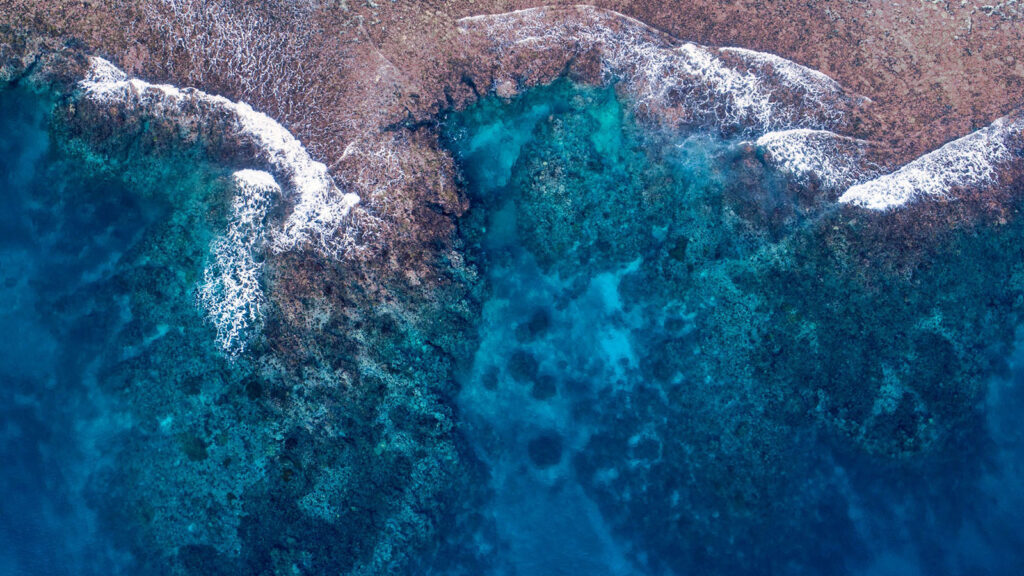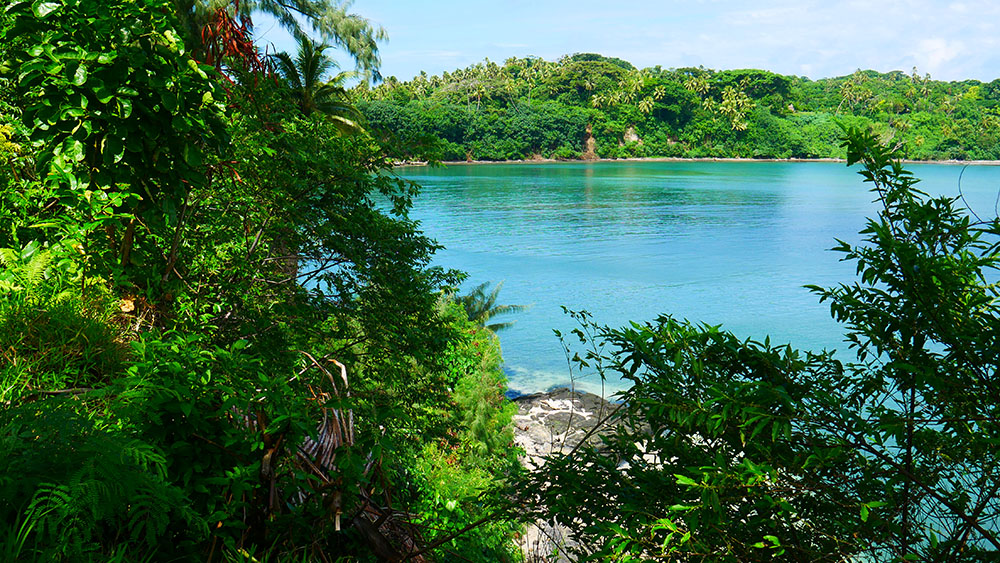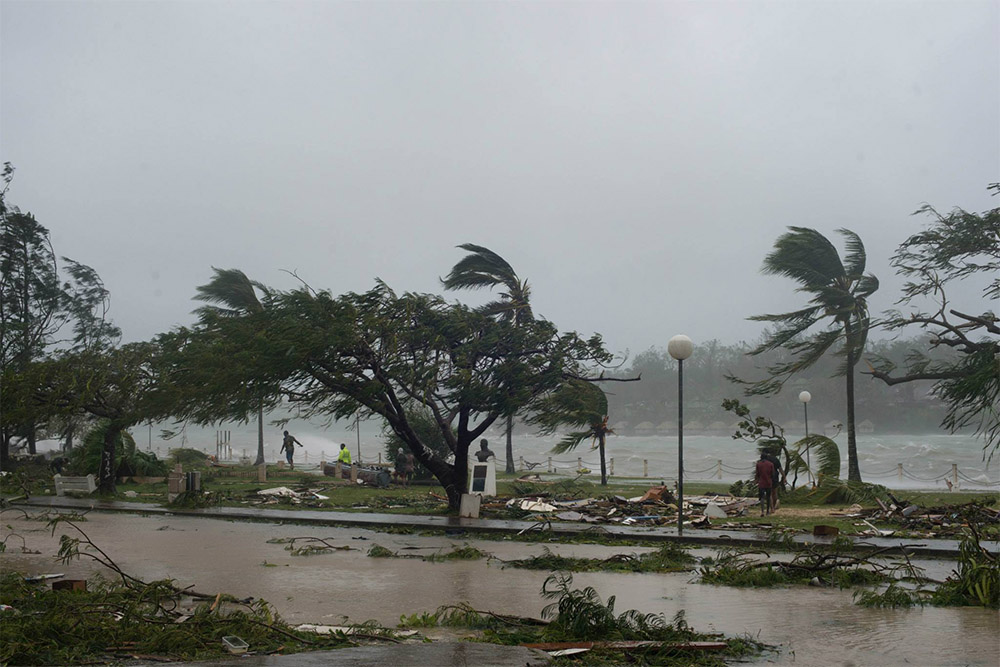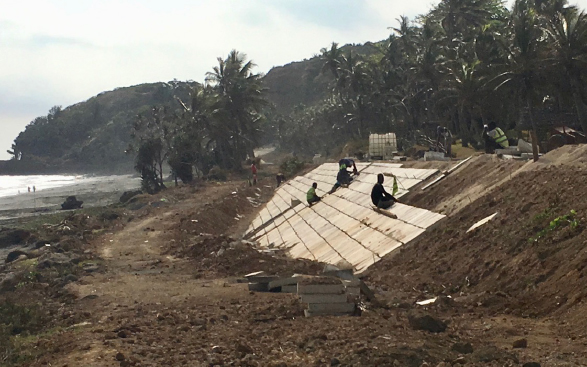
Publications
EcoAdapt in the Pacific project outputs
Research Publications
Ecosystem based adaptation MOOC
August 25, 2022
Through the EcoAdapt project Griffith University has contributed towards a mass open online course (MOOC): Ecosystem-based Adaptation: Working with nature to adapt to a changing climate.
Pacific EcoAdapt phase 1 report
October 28, 2021
The Phase 1 final report for the Pacific EcoAdapt project, which aimed to develop the new knowledge and methods needed to help ensure that the benefits of ecosystem-based adaptation are understood and the data , methods and tools needed to inform planning and decision making are available.
Water quality in coral reef lagoon system
September 15, 2021
Coastal waters are used for recreational activities such as swimming or fishing. In the South Pacific Islands, most of the population and infrastructures are concentrated near the coast. Wastewater discharge are often not well regulated and released in the coastal waters. Growing population and effect of climate change might compromised the water quality of coastal lagoon if no management plans are established.
How ecosystem-based adaptations to climate change influence community wellbeing
September 8, 2021
Climate change poses significant threats to the wellbeing and livelihoods of people and the ecosystems in many small island states. Adaptation solutions must counteract these threats while also supporting development in vulnerable communities. Suitable adaptation options need to ensure that connections between the social, economic and environmental dimensions of socio-economic systems are defined in a way that can support how decisions are made (and by whom) and how these can impact other parts of these systems.
Ecosystem-based Adaptation is an approach not just an option
August 20, 2021
Ecosystem Based Adaptation (EbAEbA Ecosystem-based adaptation - an adaptation approach to climate- and environmental-change which primarily deploys ecosystems and ecosystem functions to mitigate risks from hazards.) harnesses biodiversity and the services provided by ecosystems to support communities adapting to a changing climate. EbA has been widely applied throughout the world as one of many adaptation options but considering it as an isolated project or option to be implemented limits its application.
Effective coastal adaptation needs accurate hazard assessment
July 2, 2021
Coastal hazard assessments involved many processes and it is necessary to study and understand the local processes before choosing an adaptation strategy. The adaptation is very specific to the case study and can’t be transferrable to another site without knowing the hazards and processes involved.
Reducing risk to climate change projects
May 20, 2021
Over recent decades, substantial funding from a variety of sources has been directed towards climate change adaptation projects in Pacific Island countries. There remains, however, considerable uncertainty about which factors influence adaptation project completion, as a pre-cursor to effective adaptation. In this study, we empirically establish the links between project attributes(duration, funding, cash co-financing, in-kind contributions, location, and adaptation approach) and whether a project is likely to complete or be terminated.
Climate change adaptation strategies for coral reef ecosystems
May 1, 2021
This paper reports on a dynamic modelling framework for ecosystem-based adaptation planning in a SIDSSIDS Small Island Developing States are a distinct group of 38 UN Member States and 20 Non-UN Members/Associate Members of United Nations regional commissions that face unique social, economic and environmental vulnerabilities. island context that is focussed on the assessment of coral reef health and resilience under different climate change scenarios, and the consequential economic and human well-being impacts. Port Resolution, Tanna Island was used as a case study to develop, test and model the fringing coral reef, local community and resultant socio-ecological system.
Tourism climate change knowledge system
January 2, 2021
This paper explores the knowledge around climate change across academic, practice and political domains to identify gaps in understanding and opportunities for improved action to address climate risks.
Community attitudes towards ecosystem based approaches to climate change
November 1, 2020
Village communities might have very different expectations and aspirations towards environmental and social change, natural resource management and economic opportunities, which will have important implications on taking an ecosystem based approach to climate change adaptation. This study surveyed the community of Port Resolution, on Tanna, to gain insights into these attitudes.
Data collection and unexpected events
August 26, 2020
This paper is a story of our field data collection in Efate Island illustrating all the challenges and unexpected events. This data collection campaign was a great experience and has allowed to establish good connection with the local government, the University and local communities. The involvement of the local communities was found crucial to lead this monitoring campaign.
Community attitudes towards ecosystem based approaches to climate change
August 18, 2020
Village communities might have very different expectations and aspirations towards environmental and social change, natural resource management and economic opportunities, which will have important implications on taking an ecosystem based approach to climate change adaptation. This study surveyed the community of Port Resolution, on Tanna, to gain insights into these attitudes.
Tourism benefits from ecosystem-based approaches to climate change
July 29, 2020
Tourism is strongly interlinked with the natural and social environment, in particular in destinations around the Pacific, such as Vanuatu. These environments are vulnerable to climate change which impacts on the social–ecological system of destinations. Ecosystem-based Adaptation (EbA) uses ecosystems to manage the risks of climate change.
Estimating nature’s value to Pacific islands
June 10, 2020
Rural communities in Pacific small island developing states (SIDS), which rely directly and acutely on nature’s goods and services for food and material, face a range of interlinking threats to their management of natural resources. These threats are exacerbated by climate change related risks and occur against the backdrop of rapid social and economic transition.
Benefits of agricultural extension programmes as climate adaptation
May 31, 2020
Investments in island-scale agricultural extension programmes can help small-scale farmers reduce the risks of innovating with new techniques and crop variants as a response to environmental change. These programmes can reduce harvesting pressure on forests and coastal reefs, protecting these ecosystems as buffers against the impacts of climate change.
Mapping long-term coral reef ecosystems regime shifts
May 1, 2020
Coral reefs are among the most fragile ecosystems that provide essential services to local island communities. It is known that climate change impacts are the leading factors in coral reefs regime shift. Naturally, exploring the characteristics and interactions shaping regime shifts of coral reefs are critical in managing system pressures; enhancing resilience; aiding their regeneration and recovery process, and restoring habitat complexity.
Adaptation strategies for coral reef ecosystems under local pressures and changing climate
April 1, 2020
We modelled coral reef stressors and potential adaptation interventions using the coral reef ecosystem of Port Resolution on Tanna Island as a microcosm of endangered Pacific Small Island Developing States.
Coastal processes within a coral reef lagoon, Erakor, Vanuatu
March 2, 2020
No data monitoring was done in Erakor Lagoon on Efate, in Vanuatu, to assess current and future risks to the coral reefs. We have led a month data collection in Erakor to improve our knowledge of coastal processes in this area and of wave transformation over the reef.
Annual report 2019
December 31, 2019
As the EcoAdapt project comes to the end of its fourth year, the research team has again increased both engagement with stakeholders and research outputs which will improve the prospects for Ecosystem Based Adaptation to be appropriate and effectively used in Vanuatu and elsewhere in the Pacific and globally.
Adopting a whole of system approach to climate risk in Vanuatu
October 15, 2019
Understanding climate risk in Vanuatu is critical to the success of the tourism industry. Given the connections between economic, socio-cultural, political, and environmental variables in destinations throughout Vanuatu, assessments of climate risk requires a whole of system approach. Mapping linkages and interactions can help to explore climate risks and impacts and safeguard the industry from exposure and maladaptation.
Local context shapes resilience and climate risk in tourism
October 2, 2019
While climate change threatens tourism across many scales, local context ultimately determines climate risk and resilience. This paper explores the role of local context in shaping the future of tourism, with a strong focus on climate risk and opportunities for adaptation.
Seasonal, extremes and wave climate variability of the Southwest of Efate Island, Vanuatu
September 2, 2019
Wave climate variability is important for assessing coastal hazards and inform coastal planners of coastal adaptations needed. We wrote a paper on wave climate variability (link) in the South West of Vanuatu to improve coastal hazard assessments in this region where monitoring data are often absent.
Predicting sea-level rise induced coastal erosion in Tanna Island
May 1, 2019
Anticipated sea level rise in coastal regions is expected to worsen the impact of coastal hazards such as erosion, inundation and flooding from storm surges. Accordingly, the resulting impacts on coastal settlements and infrastructure will be widespread. These impacts are particularly critical in small islands as the settlements and infrastructure are mainly located along coastlines with almost no, or very limited relocation options.
Integrative climate change adaptation planning approach in the Pacific
November 1, 2018
Adapting to changing climate requires taking steps to prevent or reduce the negative impacts of these changes on socio-ecological systems. It also requires the integration of disciplines, stakeholders, different modelling approaches, treatment options, and scales of analysis. To address these issues, we reviewed 116 peer-reviewed research papers to understand planning frameworks, methods and tools utilised in the region.
Using local indigenous knowledge to inform ecosystem-based adaptation
October 2, 2018
Incorporating local knowledge, especially indigenous and traditional knowledge, into ecosystem based adaptation plans will strengthen their appeal and success. Failure to incorporate local knowledge can result in maladaptation.
What constrains ecosystem-based adaptation?
September 2, 2018
While ecosystem-based adaptation is a popular approach to managing climate change risks, uptake is still low. This paper explores the constraints and barriers around the adoption of ecosystem-based adaptation and seeks to enable practitioners and academics a pathway to embrace all of the dimensions involved to increase uptake and success.
How we protect buildings and communities from sea level rise due to global warming
June 28, 2018
Currently, the standard approach to defending buildings and other structures from the rising sea level impacts is through construction of a concrete or rock seawall, or some similar kind of so-called “capital works”. However, these interventions destroy or degrade natural ecosystems. One solution that avoids this problem is to use ecosystems to help reduce the risks from increasing coastal inundation and erosion.
Ecosystem and resilience assessment
July 19, 2017
The Ecosystem and Socio-economic Resilience Analysis and Mapping (ESRAM) project ...
